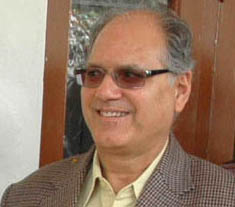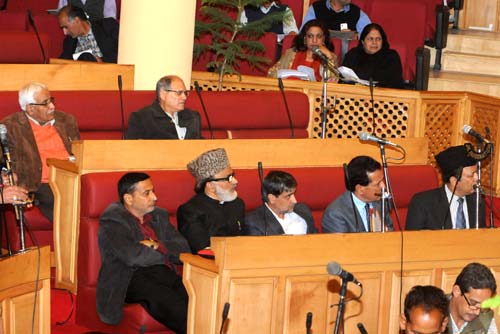In the House of Elders, three sitting lawmakers are erstwhile Chief Secretaries who have served the J&K state in various capacities. While one of them was inducted into politics for larger political gains even before his retirement, the other two joined soon after they left office, Bilal Handoo reports.
In the Upper House of Jammu and Kashmir state legislative, three former chief secretaries of the state – Sheikh Ghulam Rasool, Vijay Bakaya, and BR Kundal – have assumed the charge of state’s lawmakers.
In the 36 member House of Elders, Sheikh Ghulam Rasool and Bakaya represent National Conference while Kundal represents Congress. Now, donning the role of lawmakers, they say that they are finding a new role different from the one they played earlier.
Shiekh Ghulam Rasool
 He was the first among the three who took over the post of Chief Secretary (CS) of Jammu and Kashmir from September 21, 1992 to April 15, 1994. During his tenure, Kashmir was brewing with armed rebellion against the Indian rule. But Rasool, who is now a NC lawmaker, maintains that he did his best to work for the welfare of the people.
He was the first among the three who took over the post of Chief Secretary (CS) of Jammu and Kashmir from September 21, 1992 to April 15, 1994. During his tenure, Kashmir was brewing with armed rebellion against the Indian rule. But Rasool, who is now a NC lawmaker, maintains that he did his best to work for the welfare of the people.
“I tried everything under my capacity to work for the betterment of the society,” he says. “As a public servant, my job was to address the grievances of the people without letting law and order to go out of control.”
Born in Ganderbal district of Kashmir, Sheikh had his initial schooling at a local school and graduated with first grade from Amar Singh College, Srinagar. He won a gold medal in Law and Mathematics, and was later appointed as a lecturer. But he subsequently joined the civil services where he served in various positions including as Deputy Commissioner, Srinagar, besides working as Secretary in Public Works, Home, Industries, Agriculture and Finance.
He retired in 1995 and after one year joined National Conference in 1996. “Actually, it was Farooq Abdullah who persuaded me to join the politics,” he says. On February 21, 2010 the government recommended him for nomination to legislative council. How did he see the transition?
“For me, it is the continuation of the public services,” he replies. “But yes, as a CS, one cannot question the government policy, but as a lawmaker, one can.”
He rates both the official duties as bright but derives more satisfaction from being a member of legislative council where he is able to highlight the issues pertaining to common man. “To represent people inside the House is a relief as it helps me in drafting better governing legislations for them,” he says.
He rates the Hazratbal siege of October 1993 when 50 militants holed inside the sacred shrine refused to surrender, as one of his toughest challenges as the head of state’s bureaucracy. “To handle that situation was one of the most challenging tasks of my bureaucratic career,” he says.
Vijay Bakaya
 Bakaya served as Chief Secretary of J&K from August 01, 2005 to May 31, 2006. An Indian Administrative Service (IAS) officer of 1970 batch, he served the state in different capacities for 36 years and for one year after his retirement served as advisor to the then chief minister Ghulam Nabi Azad.
Bakaya served as Chief Secretary of J&K from August 01, 2005 to May 31, 2006. An Indian Administrative Service (IAS) officer of 1970 batch, he served the state in different capacities for 36 years and for one year after his retirement served as advisor to the then chief minister Ghulam Nabi Azad.
Bakaya followed the footsteps of his predecessor, Shiekh Ghulam Rasool after retirement, by joining politics. He was elected to the legislative council on National Conference ticket in 2009 for a term of six years.
Now finding himself in an eventful atmosphere of legislative council, Bakaya says both roles are different but have their own obligations and mandates. “As a CS, I was government servant. Now when I am a lawmaker, I am public servant,” he says.
He was CS of the state when PDP-Congress led government was in power in state. He says he had to act as a ‘bridge’ between the two coalition partners. “I had to balance the decision taken by two coalition partners,” he says.
Born in Srinagar on March 3, 1946, he left for Agra with his father in 1950 at the age of four where he studied from Class I to Class VII at St. Peters Convent. Later, he left Agra with his father for Jaipur where he studied Class VIII at Senior Cambridge at St Xavier’s School up to 1962.
Bakaya did BA (Hons) in English Literature in 1966 from Rajasthan University. Later, he also did MA in History from the same university in 1968. He taught History for two years there.
In J&K, he was assigned many important jobs in the government at different times. His career touched the peak when he was appointed as Chief Secretary in 2005. His induction in the National Conference party was seen as a move aimed at garnering support from the migrant Kashmiri Pandits ahead of the next Assembly elections in 2008.
“There is still a long way to go. The options are numerous such as the Rajya Sabha,” he says.
BR Kundal
 Kundal is the latest among the three top bureaucrats who held the office of CS and joined politics. He served as CS of J&K from November 1, 2007 to June 2, 2008. An IAS officer of the 1972 batch, Kundal was the first Scheduled Caste officer to make it to the top administrative post in the state.
Kundal is the latest among the three top bureaucrats who held the office of CS and joined politics. He served as CS of J&K from November 1, 2007 to June 2, 2008. An IAS officer of the 1972 batch, Kundal was the first Scheduled Caste officer to make it to the top administrative post in the state.
Now that he is wearing the shoes of a lawmaker, he says the transition was not difficult. “As a CS, one facilitates the decision of government,” he says. “While being a lawmaker, one has to highlight the public grievances, seek redressal and to highlight the activities of the government.”
Throughout his bureaucratic career, Kundal headed task forces on Housing and Urban Development Department, Economic Reconstruction Agency, Principal Secretary, Power, Principal Secretary, Agriculture Production department, Secretary Home, Financial Commissioner, Power, and other posts.
Born in RS Pora, Jammu on February 11, 1949, Kundal served as a teacher in School Education Department for some time before doing his MA in Political Science from Jammu University. He was promoted as Financial Commissioner on April 21, 2005. He has also worked as Divisional Commissioner, Jammu.
Kundal is known for his fair amount of good will and popularity among the rank and file of employees in the state. He also headed the probe initiated by the Jammu and Kashmir government to look into the allegations of “man-made scarcity” of timber created by the state’s Forest Department. It was Azad who appointed Kundal to investigate the matter that rocked the state in 2007.
During the then chief minister Ghulam Nabi Azad’s tenure, there were calls for making Kundal a minister on the basis that Kundal was the first scheduled caste officer to rise to the top of the IAS ladder in the state. Besides, Kundal’s apparent loyalty towards Azad also worked for him. However, Azad’s decision hadn’t gone down well with the party legislators from his own community or with other leaders hoping for a cabinet berth.
The issue had even reached New Delhi with dissenting leaders approaching the Congress’s Scheduled Castes-Scheduled Tribes Cell with complaints that Kundal could not represent them in the Council of Ministers. Azad was in Delhi at the time and the seriousness of the dissent is believed to have led to the sudden cancellation of Kundal’s oath-taking ceremony.
But finally on June 7, 2008, many believe Azad’s intervention paved way for Kundal to become the first serving Chief Secretary to join politics. He took oath as a minister representing Congress at Raj Bhavan. “As a lawmaker, one is not bound as CS,” he says. “One can give free inputs being a lawmaker than being a bureaucrat.”


